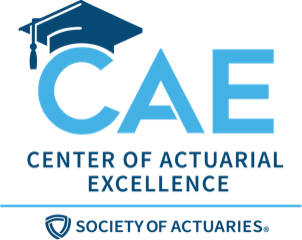Actuarial Science B.S.
RMU's B.S. in Actuarial Science is an internationally recognized program that prepares students for successful and rewarding careers as actuaries. Recognized by the Society of Actuaries as one of only 24 Centers of Actuarial Excellence in the country, RMU places a priority on professional certification exams, with curriculum that integrates the mathematical foundations of actuarial science with intensive business education and communication skills. Students gain cultural and civic awareness as well as the technical proficiency and analytical ability to be productive professionals.
Build Career Connections
Graduates become actuaries — consistently ranked as one of the best professional careers — at leading health, life, and accident insurance companies. Students often attain paid internships with these same companies. Dozens of local and national employers attend RMU’s annual Actuarial Science Career Day, including Aetna, Cheiron Consulting, Cigna, Erie Insurance, Highmark, Mercer Human Resource Consulting, Nationwide, Northwestern Mutual, Penn Mutual, Progressive, and UPMC.

Contact Information
Heather H. Elfen, Ph.D.
Department Head, Mathematics
Associate Professor of Mathematics
Department of Mathematics
elfen@rmu.edu
412-397-3533 phone
Christophe Groendyke, Ph.D.
Director, Actuarial Science
groendyke@rmu.edu
412-397-6054 phone
- Additional Program Details
-
Actuaries apply mathematical principles and techniques to solve problems in finance, insurance, and related fields. They are involved with every aspect of the insurance industry and must possess strong mathematical skills and a solid business background to apply their technical knowledge.
Actuaries are responsible for determining rates and premiums on insurance policies and forecasting future events affecting the soundness of insurance programs. Some actuaries work with consulting firms as advisors to corporations regarding human resource and pension benefits. Government agencies, such as the Social Security Administration or insurance regulatory boards, also employ actuaries. Actuaries can specialize in life and health insurance, in property and casualty insurance, or in pension benefit programs. The profession is also at the forefront in the evolving field of predictive analytics providing actuaries with another career path option. Half of all certified actuaries work for insurance companies, one third for independent consulting companies and the remainder in education, government, and corporations.
The RMU Advantage
- RMU's actuarial science curriculum is specifically designed to help prepare students for the first seven professional actuarial exams, administered by the Society of Actuaries. There are fewer than 60 such programs in the United States, and RMU is one of only 24 designated as a Center of Actuarial Excellence in the United States.
- Classes are small and informal, taught by experienced professors dedicated to undergraduate education. We provide exam preparation seminars and impress upon our students an appreciation for the high level of commitment required to pass these professional exams.
- Special practice courses are offered in Life Insurance, Health Insurance, and Pension consulting. Each course is taught by an actuary who had worked or is currently working in these fields.
- Training to use technology begins in the freshman year and is integrated throughout the curriculum. Students gain the skills needed to apply technology in the classroom and the workplace.
- Several leading national actuarial employers have offices in Pittsburgh, including Willis Towers Watson, Mercer Human Resource Consulting, Buck Consultants, Highmark Insurance, and UPMC Insurance. Many RMU students attain highly paid summer or school-year internships with these companies as well as full-time employment after graduation.
- RMU has four faculty members whose primary assignment is in actuarial science, all of which are credentialed by the Society of Actuaries. They are active in student recruitment, retention and job placement.
- Each year, RMU hosts an Actuarial Science Career Day, where students have the opportunity to network with many local and national employers specifically interested in hiring actuaries. Recent participant companies include Aetna, Cigna, Erie Insurance, Highmark, Mercer, Nationwide, Northwestern Mutual, Penn Mutual, Progressive, and UPMC.
Curriculum
The 120-credit hour curriculum leads to the Bachelor of Science degree in Actuarial Science. It has three components:
Robert Morris University Core - 40 credits
These are the traditional liberal arts requirements of the university. Studies in humanities and social, behavioral, natural, and quantitative sciences are included.Major Courses - 71 credits
This component includes courses in accounting, finance, mathematics, statistics, microeconomics, and actuarial science.Open Electives - 9 credits
Students may select courses within university offerings to broaden their skills in some area of interest.Major Courses
- Probability I & II
- Interest Theory
- Financial Mathematics
- Loss Models I & II
- Life Contingencies I & II
- Regression Analysis
- Time Series Analysis
- Predictive Analytics
- Data Analysis with R
- Introduction to Financial Accounting
- Microeconomics
- Corporate Finance
- Mathematical Statistics
- Property / Casualty Practice Area
Strong Exam Preparation
RMU's curriculum is expressly designed to prepare students to succeed on the professional actuarial exams. Students take the first exam in the freshman or sophomore year and the second exam in the following year. Junior and senior courses cover material for the next five exams. Students also take courses in economics, finance, and applied statistics that are pre-approved by the Society of Actuaries for fulfillment of additional professional requirements (referred to as Validation by Educational Experience, or VEE).
Students generally pass several exams while in college, thereby qualifying for attractive employment opportunities. Actuaries continue to take exams while working, eventually attaining professional designations such as Associate and Fellow (the highest designation). RMU’s Actuarial Sciences program lays a solid and substantial foundation for progress toward full certification as a practicing actuary, and many of our students go on to achieve the Fellow designation before the age of 30.
RMU participates in the University Earned Credit Program (UEC) through the Society of Actuaries. Students can earn credit for several Actuarial Professional Exams by successfully completing coursework at RMU following the Society of Actuary standards. RMU is one of only 16 Universities in the US eligible to offer such credit.
Highly Competitive Program
Applicants should have a very high aptitude and solid background in mathematics, and an interest in the world of business and finance.
Students seeking to major in actuarial sciences should take as much high school mathematics as possible. A strong background in all areas of pre-calculus mathematics provides an excellent basis for university work. Students entering with college credit for calculus (either through Advanced Placement or a dual high-school/college class) may begin immediately preparing for the first actuarial exam on Probability.
Students also should have an interest in business and computer science, and in developing management and communications skills. Students planning to transfer college credits to RMU should complete courses in calculus, introductory economics, accounting, and other business-related areas.
Top-Rated Career
The first edition of the Jobs Rated Almanac (1988) had actuary as the number one career, and it has never been rated lower that fourth. The latest edition once again has actuary at the top. The editors compile statistics on 250 occupations and rank them based on six key criteria: environment, income, employment outlook, physical demands, security and stress.
Actuarial salary surveys consistently place actuary as highly competitive for starting salaries and with salary growth potential among the highest available. Compensation depends on experience, employment location and the number of exams passed. For example, Fellows of the Society of Actuaries with 15 years of experience often earn in excess of $250,000 annually.
More about Actuaries at:
www.beanactuary.org - Career info from the Society of Actuaries - Admissions and Tuition Information
-
- Minimum GPA 3.50
- Minimum B in Trigonometry and/or Pre-Calculus
- Strong high school math and science background. Preferably taken a Calculus course.
- For international students:
- Minimum TOEFL score 550 (PBT) and no category under 300, or 65 (IBT) and no category under 35, or minimum 5.5 IELTS score
- For transfer students:
- Cumulative 3.25 grade point average from colleges attended
- Cumulative 3.50 grade point average in all college level mathematics courses
- Completed Calculus I
- Students with less than 30 earned college credits must also provide a high school transcript
Sample Courses:
These are some of the classes for students in this academic program:
Top Employers

Call us at:
1-800-762-0097
School of Data Intelligence and Technology
In the School of Data Intelligence & Technology, students are immersed in cutting-edge programs that prepare them for careers in a variety of rapidly evolving fields.
Visit School Site
